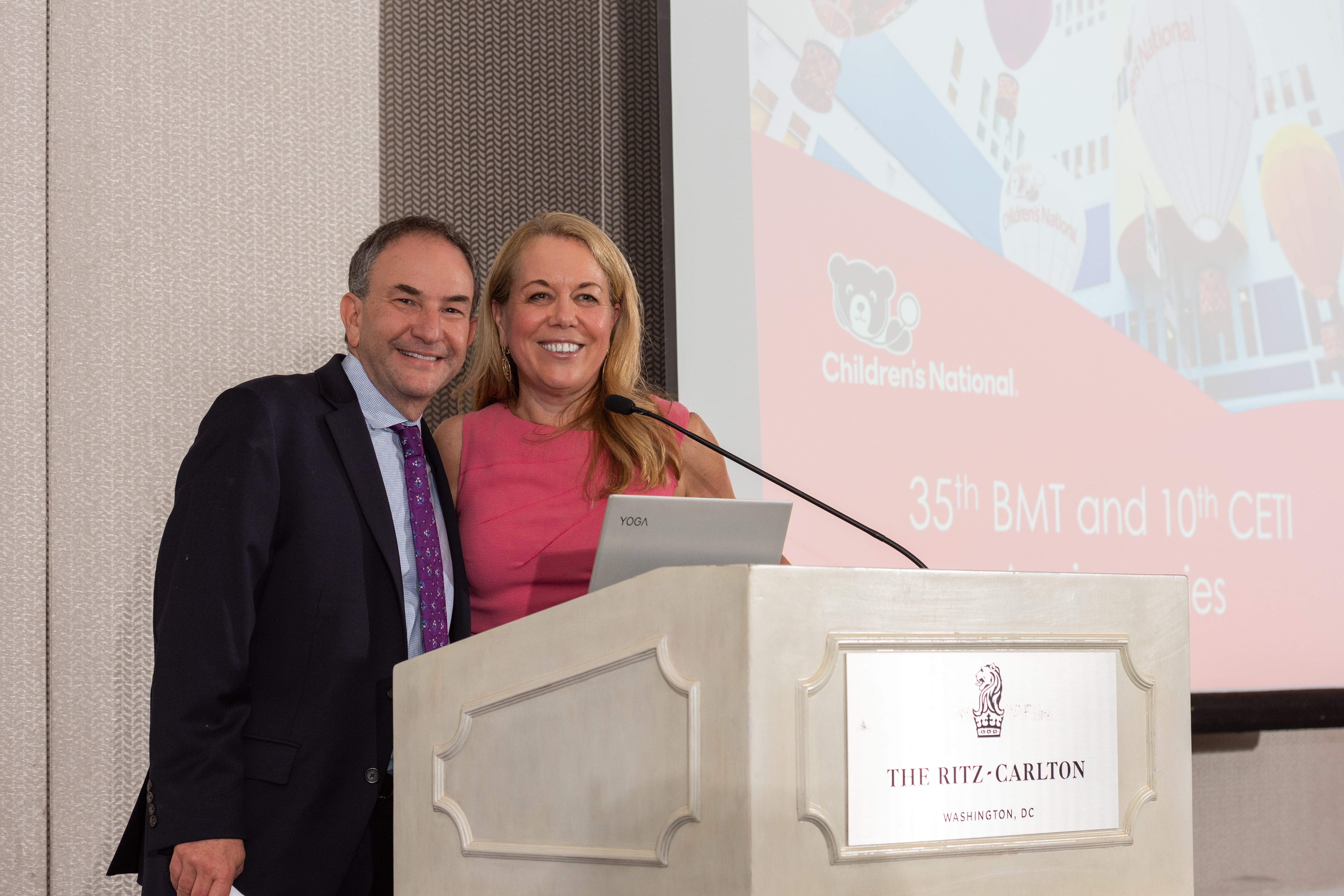CHILDREN'S NATIONAL RESEARCH INSTITUTE ACADEMIC ANNUAL REPORT 2023
'CNMC-BMT-celebration.jpg'
CCIR HIGHLIGHT
Decades of progress: Milestones in blood, marrow and cell therapy programs at Children’s National
On April 28, 2023, Children’s National celebrated significant milestones in two critical programs. The Division of Blood and Marrow Transplant (B.M.T.) marked its 35th anniversary, and the Program for Cell Enhancement and Technologies for Immunotherapy (C.E.T.I.) celebrated its tenth anniversary. These two programs represent the epitome of clinical and research cooperation between patient-facing programs and our Center for Cancer and Immunology Research.
Compassionate care driven by research in the Blood and Marrow Transplant Program
The B.M.T. program at Children’s National is the only dedicated pediatric B.M.T. program in the region. Over the past 35 years, the program’s experts have performed more than 1,620 blood and marrow transplants, establishing the program as a national leader in pediatric B.M.T. treatment advances.
The program’s priorities include reducing the burden of complications such as graft-versus-host-disease and viral infections, reducing leukemia relapse after transplant, decreasing the intensity of treatment regimens, increasing B.M.T. access for all and offering outstanding and compassionate care to patients and their families.
Focusing on advanced treatments, comprehensive care and research, the program provides children’s best chances for a good outcome. This is why parents from all over the region, country and even other countries trust it to perform their child’s bone marrow transplant.
Hitting new ground with the Cell Enhancement and Technologies for Immunotherapy Program
The C.E.T.I. program, celebrating its 10th anniversary, has made significant strides in cell and gene therapy. Established 2013, it is now comprised of over 80 faculty and staff members, generates over $6.5 million per year in N.I.H. and peer-reviewed funding and has secured over $25 million in philanthropic support. The program has also manufactured over 550 products and treated more than 300 patients with novel cell and gene therapies.
The C.E.T.I. program is one of the few worldwide using cellular therapy to reduce infection and relapse in children with blood cancers. The program’s success is a testament to the dedication and hard work of the team at Children’s National, who continue to develop new ideas and therapies.
A unique program due to its partnership with George Washington University and local collaborations with the N.I.H. and Johns Hopkins University, it has paved the way for advanced care for patients with cancer and immune-mediated disorders. Recent discoveries include finding that:
-
Naïve T cells can be primed in vitro with specificity for multiple viruses and tumor-associated (neo) antigens. (Nat Commun. 2021 Nov 18;12(1):6689)
-
Tumor-associated antigen-specific T cells (TAA-T) may prevent relapse in high-risk patients with leukemia and lymphoma as well as pediatric patients with solid tumors. (J Clin Oncol. 2019 Sep 10;37(26):2349-2359)
-
T cells specific for SARS-COV2 membrane and spike antigens have broad epitope specificity and T cell therapies targeting SARS-CoV2 are currently being evaluated as a strategy to prevent COVID-19 in high-risk patients after bone marrow transplant (Blood. 2020 Dec 17;136(25):2905-2917)
A legacy of excellence driving breakthroughs in the future
The anniversaries of these programs are not just a celebration of their longevity but also a testament to their impact. The B.M.T. program has provided life-saving treatments to children, while the C.E.T.I. program has been at the forefront of innovative cell and gene therapies.
The milestones reached by these programs are a testament to the dedication, expertise and compassion of the teams at Children’s National. As they look to the future, they continue to strive for excellence in providing safe and innovative therapies for their patients.
Looking forward, further breakthroughs will come, as C.E.T.I. was awarded the Cancer Grand Challenges award, supported by two of the largest funders of cancer research in the world – Cancer Research U.K. and the National Cancer Institute in the U.S.
The team will be working to develop next-generation cell therapies specifically for children with solid cancers. The team hopes to build a much deeper understanding of childhood solid tumors and develop and optimize novel therapies for children with these cancers, ultimately improving survival and diminishing the lifelong toxicities often experienced by survivors.
By focusing on two main programmatic areas — targeting pathogens and eliminating cancer — C.E.T.I. is integral to the research enterprise, not just at Children’s National but nationally and internationally.
